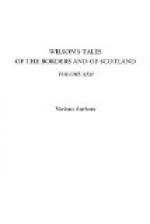“Still at work, Paul,” said Rachel, as she entered; “how long do you intend to work to-night?”
“Till the idea becomes dim, and the sense waxes thick,” replied he, as he turned his eyes upon her.
“I have something to tell you,” she continued, as she sat down on a chair between him and the fire, if that could be called such which consisted of some red cinders.
“Some other wonder,” replied he; “another cropping out of the workings of fate.”
Words these, as coming from our little artist, which require some explanation, to the effect that Paul was a philosopher, too, in his own way. Early misfortunes, which mocked the resolutions of a will never very strong, had played into a habit of thinking, and brought him to the conviction that every movement or change in the moral world, not less than in the physical, is the result of a cause which runs back through endless generations to the first man, and even beyond him. Paul was, in short, a fatalist; not of that kind which romance writers feign in order to make the character work through a gloomy presentiment of his own destiny, but merely a believer in a universal original decree, the workings of which we never know until the effects are seen. A fatalist of this kind almost every man is, less or more, in some mood or another; only, to save himself from being a puppet, moved by springs or drawn by strings, he generally contrives to except his will from the scheme of the iron-bound necessity. But Paul would permit of no such exception. The will, with him, was merely the motive in action; and as he compelled you to admit that no thought is, in man’s experience, ever called into being, only developed from prior conditions, and that, even as to an idea, the doctrine




